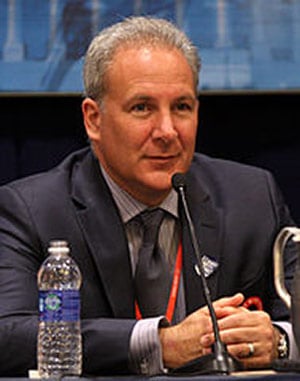 During a Feb. 14 interview with CNBC, legendary economist and Euro Pacific Capital CEO Peter Schiff made a bold claim about the U.S. Federal Reserve.
During a Feb. 14 interview with CNBC, legendary economist and Euro Pacific Capital CEO Peter Schiff made a bold claim about the U.S. Federal Reserve.
"They're going to go back to QE," said Schiff.
QE, or quantitative easing, is a fiscal policy in which a central bank creates new money in order to buy government bonds and ultimately stimulate the economy - the Fed's way of addressing the 2007-09 financial crisis.
Schiff's reasoning: Rampant inflation in the United States is just around the corner, and it's going to soar faster than the interest rate increases by the Fed.
"Inflation is headed up not just on a producer level but on the consumer level, and inflation is going to be rising at a pace that is much faster than any rate hikes that we might get from the Fed. So real rates are going to be falling even if the Fed raises nominal rates," he said.
This inflation will cause the Fed to "raise interest rates as slowly as they can possibly get away with and at some point they're going to have to come up with an excuse why they're going to stop raising rates and why they're going to cut rates again and why they're going to go back to QE," said the investment broker.
Moreover, Schiff believes that this imminent surge in inflation may actually be the fault of the central bank...
[mmpazkzone name="end-story-hostage" network="9794" site="307044" id="138536" type="4"]
Peter Schiff: Fed Is to Blame for "Lackluster Economy"
The best-selling author chastised the Fed for slashing interest rates in the first place and leaving them low for so long - ultimately leading to a weaker economy.
"[The economy] is a problem. That's why Janet Yellen is so reluctant to raise rates. That's why she's barely moved them up over the last few years, because she's afraid of the consequences when she tries to remove this unprecedented accommodation," Schiff noted.
When a national economy is weak, Schiff added, the stock market booms and is propped up at artificially high levels.
Stocks, experiencing the second-longest bull market in history, are trading at record highs.
Rare Gold Anomaly: The first time it created $1.25 billion in new wealth virtually overnight. The second time, it created a cash windfall of $6 billion - both times making in-the-know investors flat-out millionaires. And it's about to happen again, only this time we expect the cash windfall to reach $13 billion. If you take advantage of this rare gold anomaly right now, you, too, could walk away a millionaire. Details here...
Follow Money Morning on Twitter @moneymorning or Facebook.


